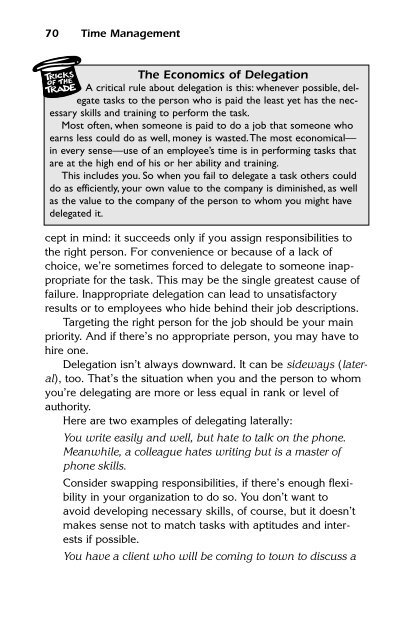Time Management - Marc Mancini
You also want an ePaper? Increase the reach of your titles
YUMPU automatically turns print PDFs into web optimized ePapers that Google loves.
70<br />
<strong>Time</strong> <strong>Management</strong><br />
The Economics of Delegation<br />
A critical rule about delegation is this: whenever possible, delegate<br />
tasks to the person who is paid the least yet has the necessary<br />
skills and training to perform the task.<br />
Most often, when someone is paid to do a job that someone who<br />
earns less could do as well, money is wasted.The most economical—<br />
in every sense—use of an employee’s time is in performing tasks that<br />
are at the high end of his or her ability and training.<br />
This includes you. So when you fail to delegate a task others could<br />
do as efficiently, your own value to the company is diminished, as well<br />
as the value to the company of the person to whom you might have<br />
delegated it.<br />
cept in mind: it succeeds only if you assign responsibilities to<br />
the right person. For convenience or because of a lack of<br />
choice, we’re sometimes forced to delegate to someone inappropriate<br />
for the task. This may be the single greatest cause of<br />
failure. Inappropriate delegation can lead to unsatisfactory<br />
results or to employees who hide behind their job descriptions.<br />
Targeting the right person for the job should be your main<br />
priority. And if there’s no appropriate person, you may have to<br />
hire one.<br />
Delegation isn’t always downward. It can be sideways (lateral),<br />
too. That’s the situation when you and the person to whom<br />
you’re delegating are more or less equal in rank or level of<br />
authority.<br />
Here are two examples of delegating laterally:<br />
You write easily and well, but hate to talk on the phone.<br />
Meanwhile, a colleague hates writing but is a master of<br />
phone skills.<br />
Consider swapping responsibilities, if there’s enough flexibility<br />
in your organization to do so. You don’t want to<br />
avoid developing necessary skills, of course, but it doesn’t<br />
makes sense not to match tasks with aptitudes and interests<br />
if possible.<br />
You have a client who will be coming to town to discuss a

















